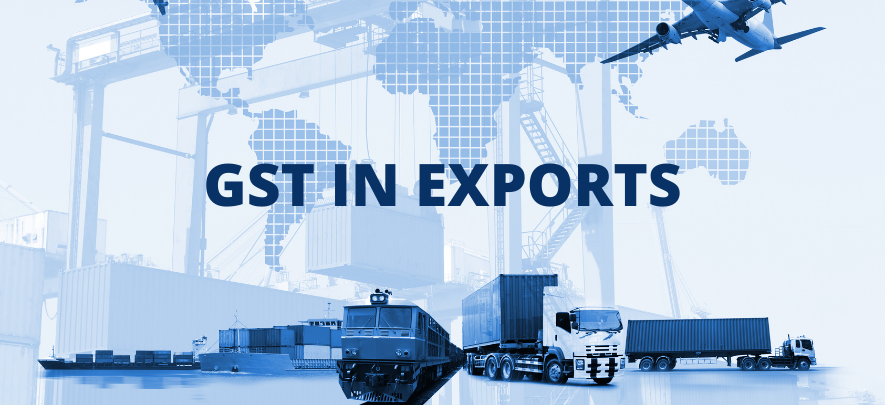Frequently Asked Questions: GST in Exports

Export Sector
Federation of Indian Export Organisations
165 week ago — 19 min read
In our previous articles we discussed how to start an export business, general provisions regarding export and import and Reserve Bank of India (RBI) regulations for exporters. In this article we will address key questions regarding Goods & Services Tax (GST) under exports.
Q. How are exports be treated under GST?
All exports are deemed as inter-State supplies. Exports of goods and services are treated as zero rated supplies. The exporter has the option either to export under bond/Letter of Undertaking without payment of tax and claim refund of ITC or pay IGST by utilizing ITC or in cash at the time of export and claim refund of IGST paid.
Q. What is Zero Rating?
Zero-rated supply” means export of goods or services or both or supply of goods or services or both to a SEZ developer or a SEZ unit as per section 16 of IGST Act, 2017. The concept of zero rating of supplies requires the supplies as well as the inputs or input services used in supplying the supplies to be free of GST.
Q. Can a person claim input tax credit in case of export of exempted goods?
Yes, any zero rated supply is eligible for input tax credit paid by such supplier. As per section 16(2) of the IGST Act, credit of input tax may be availed for making zero-rated supplies; notwithstanding that such supply may be an exempt supply.
Q. Can an exporter purchase goods without payment of tax on furnishing of a declaration form?
No, there is no such provision in GST. Tax has to be payable on their inward supplies and they can claim refund of the accumulated ITC. However, there is a 0.1% scheme in which a supplier can supply goods to an exporter by paying only 0.1% GST and claim refund of unutilised ITC. The exporter in such a scenario cannot export on payment of integrated tax and take refund. He has to adopt the LUT/Bond route only.
Q. What is the 0.1% scheme for procurement of exports by merchant exporters?
It is a scheme for merchant exporters who have an option to pay nominal GST of 0.1% for procuring goods from domestic suppliers for export vide Notification 40/2017-Central Tax (Rate) and 41/2017-Integrated Tax (Rate) both dated 23.10.2017.
Q. What would be the GST rate if the product procured by merchant exporter at 0.1 per cent is further exported on payment of IGST?
The option of payment of IGST and taking refund is not available in case the exporter has procured the goods under 0.1% scheme. He should avail the LUT facility while exporting such goods so that there is no tax liability at the time of export.
Q. Can one export under normal procedure without availing the benefit of 0.1 per cent while procuring goods for exports?
Yes, the facility of procuring goods at 0.1 per cent is an optional facility which is available subject to adhering to the conditions mentioned in Notification no. 41/2017-Integrated Tax (Rate) dated 23rd October, 2017. In case, an exporter wants to procure the goods for exports on payment of applicable GST and subsequent exports either on LUT or on payment of IGST, the exporter can do it and claim back ITC or IGST, as the case may be.
Q. Can a manufacturer exporter procure some goods to be supplied along with our own exports goods?
The Notification relating to merchant exporter only referred to a registered supplier and registered recipient. Therefore, a registered recipient, who may be a manufacturer, can procure goods from a registered supplier at 0.1 per cent to be supplied along with goods manufactured by you.
Q. How GST will be paid on the conversion of foreign currency? Will it be on full value after conversion or some other formula will be applied?
For a currency when exchanged to Indian Rupee, the value of taxable purpose shall be equal to the difference in the buying rate /selling rate, as the case may be, and the RBI reference rate for the currency at that time multiplied by the total value of unit. In case RBI reference rate is not available for the currency, the value will be gross amount of Indian Rupee provided or received by the person changing the money.
Q. What are the provisions for refund of taxes for exporters in GST?
Provisions relating to refund are contained in section 54 of the CGST Act, 2017. It provides for refund of tax paid on zero-rated supplies of goods or services or on inputs or input services used in making such zero-rated supplies, or refund of tax on the supply of goods regarded as deemed exports, or refund of unutilized input tax credit. Identical provisions exist under the IGST Act, 2017 and relevant SGST/UTGST Acts.
Q. Can unutilized input tax credit be allowed as refund to exporters?
Yes. Section 54(3) of the CGST Act, 2017 provides for refund of any un-utilized input tax credit of inputs and input services at the end of any tax period.
Q. How soon will refund of ITC (Input Tax Credit) in respect of export of goods or services be granted during the GST regime?
- Acknowledgement will be issued within 15 days from the date of application for refund
- Refund of 90% will be granted provisionally within seven days of acknowledgement of refund application.
- Remaining 10% will be paid within a maximum period of 60 days from the date of receipt of application complete in all respects.
- Interest @ 6% is payable if full refund is not granted within 60 days.
Q. What is the procedure for IGST refund on exports?
No application for refund is to be made for IGST as the Shipping Bill itself is a claim for refund. In the case of refund of IGST paid on exports: Upon receipt of information regarding furnishing of valid return in Form GSTR-3 by the exporter from the common portal, the Customs shall process the claim for refund and an amount equal to the IGST paid in respect of each shipping bill shall be credited to the bank account of the exporter.
Q. Can duty credit scrips received as incentive by exporters such as MEIS, SEIS etc be utilised for payment of all duties at the time of import?
These scrips can be utilised only for payment of Basic Customs duty and Safeguard Duty, Transitional Product Specific Safeguard Duty, and Antidumping Duty. In case of non-GST supplies like petroleum products etc, the scrips can also be used for payment of duties like central excise, CVD/ SAD. The scrips cannot be used for payment of any type of GST- IGST/CGST/SGST/UTGST or compensation cess.
Q. Whether payment of Foreign Agent commission will be taxable under GST?
The foreign agent, who facilitates the supply of goods, is included within the definition of intermediary. The place of supply of service for services provided by intermediary would be the location of service provider, i.e. the place where he is registered. Since a foreign agent is located outside India and not registered in India, the commission paid to him will not be taxable.
Q. Whether commission received by Indian Buying Agent from foreign customer in foreign currency is exempted from GST? Does Buying Agent need to register for GST?
The commission received by buying agent in India will be taxable. The buying agent should register so that he/she can claim ITC to lessen his/her liability by using ITC.
Q. What is the validity of LUT?
Legal Undertaking (LUT) is valid for a Financial Year.
Q. What is reverse charge in GST Law?
As per Section 2 (98) of the CGST Act, 2017, “reverse charge” means the liability to pay tax by the recipient of supply of goods or services or both instead of the supplier of such goods or services or both under subsection (3) or subsection (4) of section 9 of the CGST Act, 2017, or under subsection (3) or subsection (4) of section 5 of the IGST Act, 2017.
Q. Whether goods sent by a person to a job worker should be treated as supply and will they be liable to GST?
No, the goods sent by a registered person to a job worker is not a supply, as there is no transfer of title and no consideration for the goods is involved. In terms of section 143 of the CGST Act, 2017, a registered taxable person (the principal), after following the prescribed procedure, may send any inputs or capital goods, without payment of GST, to a job worker for job work and the principal shall either (i) bring back such inputs or capital goods after completion of job work or otherwise within the prescribed period, i.e. 1 year in case of inputs and 3 years in case of capital goods, or (ii) supply such inputs or capital goods, within such prescribed period, on payment of tax within India, or with or without payment of tax for export, as the case may be. If the goods or, capital goods, as the case may be, are not returned to the principal within the time specified above, the same shall be deemed to have been supplied by the principal to the job worker on the date the goods were sent out to the job worker and the principal shall be required to pay tax accordingly on such supplies.
Q. Whether the deductee can claim the input tax credit on the deduction of tax at source amount?
No, the tax deducted at source is not input tax credit. However, the amount deducted shall be credited to the electronic cash ledger (upon being accepted by the deductee in his Form GSTR-2A) of the deductee and can be utilized for payment of output tax.
Q. What value should be shown in Table 6A and 6B of GSTR for exports or supply to SEZ against Bond/LUT?
Export transactions effected without payment of IGST (under Bond/ Letter of Undertaking (LUT)) needs to be reported under “0” tax amount heading in Table 6A and 6B.
Q. Will export of goods to Nepal and Bhutan treated as zero rated and thereby qualify for all the benefits available to zero rated supplies under the GST regime?
Export of goods to Nepal or Bhutan fulfils the condition of GST Law regarding taking goods out of India. Hence, export of goods to Nepal and Bhutan will be treated as zero rated and consequently will also qualify for all the benefits available to zero rated supplies under the GST regime. However, the definition of ‘export of services’ in the GST Law requires that the payment for such services should have been received by the supplier of services in convertible foreign exchange.
Q. How clearances of goods supplied from DTA will be effected to Special Economic Zones?
The clearances effected to the SEZ are zero rated supplies in terms of Section 16 of the IGST Act, 2017. Accordingly, the supplier can claim refund of IGST paid on such supplies or clear the same under bond/letter of undertaking and claim refund of the unutilised ITC.
Q. When a SEZ unit or SEZ developer procures any goods or services from an unregistered supplier, whether the SEZ unit or SEZ developer needs to pay IGST under reverse charge or these will be zero rated supplies?
Supplies to SEZ unit or SEZ developer have been accorded the status of inter-State supplies under the IGST Act. Under the GST Law, any supplier making inter-State supplies has to compulsorily get registered under GST. Thus anyone making a supply to a SEZ unit or SEZ developer has to necessarily obtain GST registration.
Q. Whether a company having a unit in SEZ and a unit in DTA require separate registration for both the units?
Yes, as per Section 8(1) of CGST (Registration) Rules, 2017 a person having a unit(s) in a Special Economic Zone or being a Special Economic Zone developer shall make a separate application for registration as a business vertical distinct from his other units located outside the Special Economic Zone.
Q. Can a person paying tax under composition scheme make exports or supply goods to SEZ?
No, because exports and supplies to SEZ from Domestic Tariff Area are treated as inter-State supply. A person paying tax under composition scheme cannot make inter-State outward supply of goods.
Q. Whether a foreign tourist carrying Indian goods would be eligible for GST refund when leaving the country?
An enabling mechanism has been introduced in Section 15 of the IGST Act, 2017 whereby international tourists procuring goods in India, while leaving the country can seek refund of integrated tax paid by them. The term, “tourist” has been defined and refers to any person who is not normally a resident of India and who enters India for a stay of not more than 6 months for legitimate non-immigrant purposes.
Q. How can IGST liability on imports or on inter-state supply be settled?
IGST on imports has to be paid in cash only as it is charged on reverse charge. The inter-state IGST can be paid by utilizing ITC to the extent available and balance by cash. The use of ITC for payment of IGST will be done in the following order: Firstly ITC of IGST shall be used for payment of IGST. Once ITC of IGST is exhausted, the ITC of CGST shall be used. If ITC of both IGST and CGST are exhausted, ITC of SGST shall be used. Remaining IGST liability shall be discharged in cash.
Q. Jewellery is sold to the end consumer at a total value of Rs 50,000/- (gold value is Rs 45000/- and making charges Rs 5000/-). Whether GST @ 3 per cent on the total value or @ 3 per cent separately on the gold value and @ 5 per cent on making charges would be chargeable?
GST is payable at the rate of 3 per cent on the total transaction value of jewellery, irrespective of the fact that the making charge is shown separately or not.
Q. Is GST payable on goods not intended to be sold, taken out for participation in overseas exhibitions and trade fairs and brought back into India after exhibition?
GST is not payable in such cases. Exporters will need exhibition participation letter and no foreign exchange involved letter from the concerned bank for the purpose of exchange control requirements. At the time of re-import, identity of goods imported with export goods needs to be established to seek exemption from import duty in accordance with Customs provisions. IGST will be exempted at the time of re-import in view of exemptions granted under Customs.
Q. What is the GST rate on supply of scrips from an exporter to an importer? Can duty credit scrips received as incentive by exporters such as MEIS, SEIS, etc be used for payment of all duties at the time of import?
The GST rate on sale/transfer of scrip (supply) is Nil. However, these scrips can be utilised only for payment of Basic Customs duty. IGST cannot be paid by utilising these scrips nor can such scrips can be used for settling CGST or SGST liability.
Q. How to determine that IT services provided by one constitute export of service?
The supply of any service is considered an export of service, when the following conditions are satisfied (1) the supplier of service is located in India; (2) the recipient of service is located outside India; (3) the place of supply of service is outside India; (4) the payment for such service has been received by the supplier of service in convertible foreign exchange; and (5) the supplier of service and the recipient of service are not merely establishments of a distinct person in accordance with explanation 1 of section 8 of the IGST Act, 2017.
Q. Whether a manufacture of exempted goods for export having input stage credit used in the manufacture of exported goods would be eligible for refund if the supply remains an exempted supply?
Under IGST law a person engaged in export of goods which is an exempt supply is eligible to avail input stage credit for zero rated supplies. Once goods are exported, refund of unutilized credit can be availed under Section 16(3)(a) of IGST Act, 2017 and Section 54 of the CGST Act, 2017 and the rules made there under exports made prior to 1st July 2017 for which application for fixation of brand rate is yet to be filed.
Q. What happens to GST if recipient does not pay to supplier in respect of a taxable supply under GST?
If the recipient fails to pay to the supplier the amount towards the value of supply along with tax payable thereon within a period of 180 days from the date of issue of invoice by the supplier, the amount of input tax credit availed proportionate to the amount not paid would be added to his output tax liability along with interest thereon. The ITC so reversed can be reclaimed by the recipient after payment of consideration along with tax payable there on subsequently.
Q. Will the principle of unjust enrichment apply to exports?
The principle of unjust enrichment is not applicable in case of exports of goods or services as the recipient is located outside the taxable territory. However, the principle of unjust enrichment will be applicable in case of refunds against supplies to SEZs, even though such supplies are zero rated.
Q. How will imports be taxed under GST?
Import of Goods and Services are treated as deemed inter-state supplies and IGST is levied on import of goods and services in to the country.
Q. Whether high seas sales treated as supply in GST?
'High Sea Sales' is a common trade practice whereby the original importer sells the goods to a third person before the goods are entered for customs clearance. After the High sea sale of the goods, the Customs declarations i.e. Bill of Entry etc. is filed by the person who buys the goods from the original importer during the said sale. IGST on high sea sale (s) transactions of imported goods, whether one or multiple, shall be levied and collected only at the time of importation i.e. when the import declarations are filed before the Customs authorities for the customs clearance purposes for the first time. Further, value addition accruing in each such high sea sale shall form part of the value on which IGST is collected at the time of clearance.
Having an Online Store (ecommerce website) empowers exporters to showcase their products and services effortlessly to international buyers across the world. GlobalLinker recently conducted a webinar to highlight the simple steps for building a strong digital presence for your business to boost export opportunities. Watch the highlights here.
Image source: Canva
Disclaimer: The views and opinions expressed in this article are those of the author and do not necessarily reflect the views, official policy or position of GlobalLinker.
Posted by
Federation of Indian Export OrganisationsFIEO is the apex international trade promotion organisation of India. Directly and indirectly it represents the interest of over 200,000 exporters in India. FIEO has 17 offices in...
View Federation of Indian 's profile
Most read this week













Comments
Share this content
Please login or Register to join the discussion